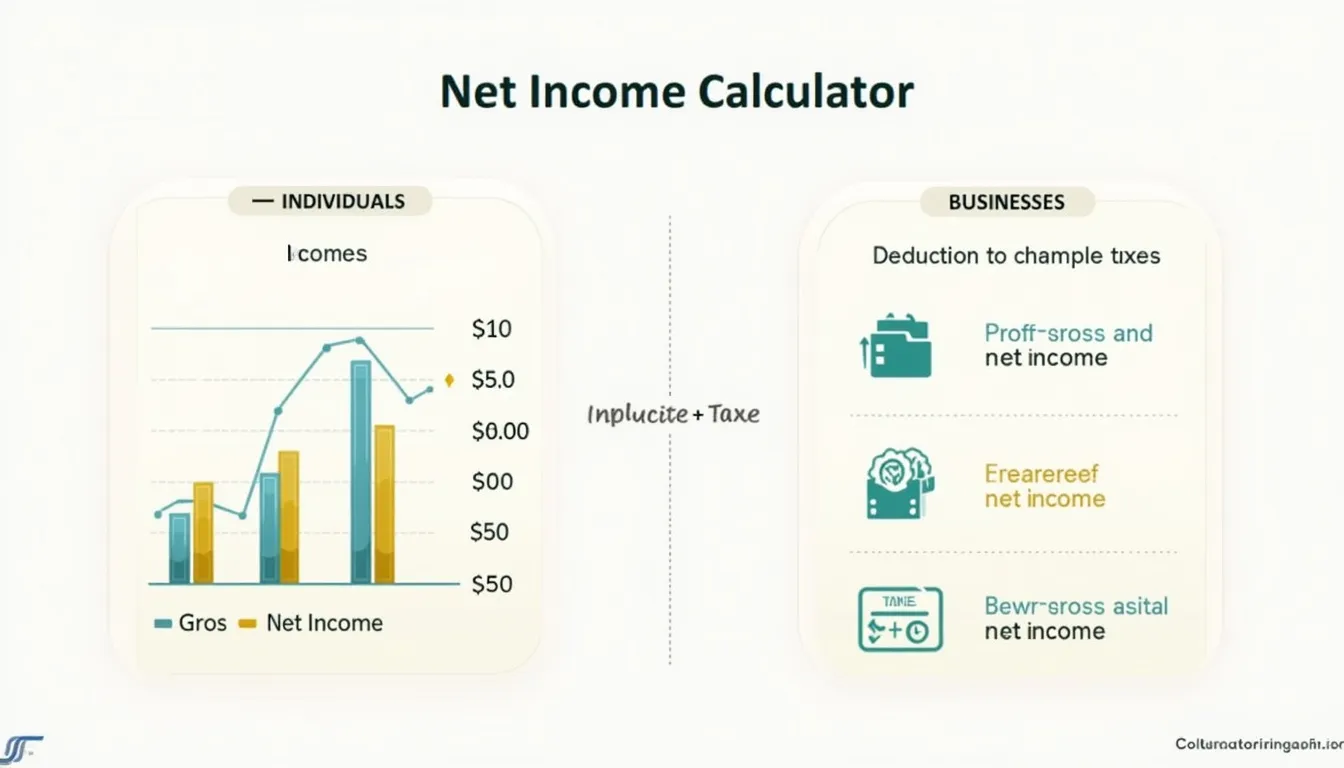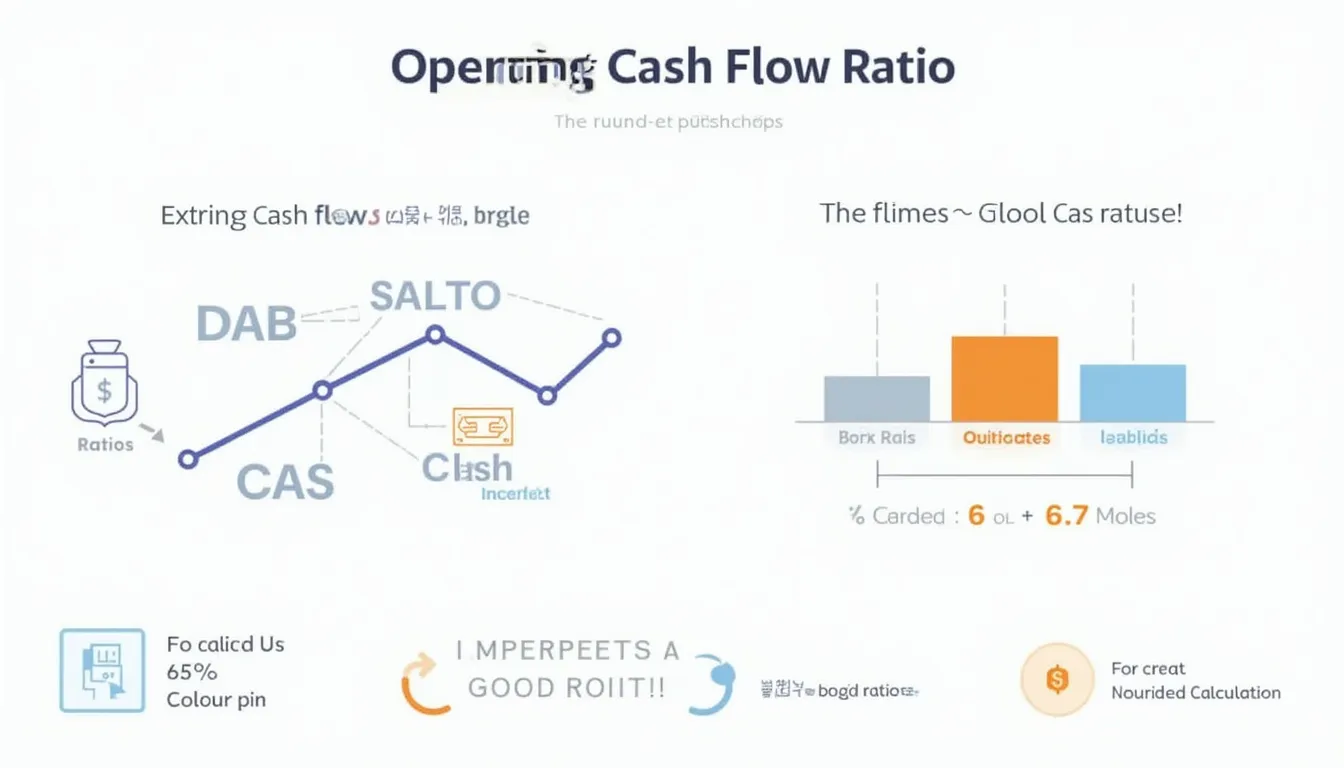Net Income Calculator
Is this tool helpful?
How to use the tool
1 . Select your profile
- Individual – personal salary, freelance or pension income.
- Business – company revenue, including sole proprietorships and LLCs.
2 . Enter the fields
For individuals
- Gross Income: Total pay before anything is withheld. Examples – 82 000 or 94 500.
- Deductions: 401(k), HSA, insurance, etc. Examples – 8 000 or 11 200.
- Taxes: Federal, state, FICA. Examples – 19 000 or 23 700.
For businesses
- Total Revenue: Sales or service income. Examples – 920 000 or 1 150 000.
- COGS: Direct production costs. Examples – 410 000 or 520 000.
- Operating Expenses: Rent, payroll, utilities. Examples – 230 000 or 305 000.
- Interest Expenses: Debt servicing. Examples – 15 000 or 27 000.
- Taxes: Corporate or pass-through. Examples – 45 000 or 62 000.
3 . Apply the formulas
Individual
$$\text{Net Income}= \text{Gross Income} – \text{Deductions} – \text{Taxes}$$
Business
$$\text{Net Income}= \text{Total Revenue} – \text{COGS} – \text{Operating Expenses} – \text{Interest Expenses} – \text{Taxes}$$
4 . Example calculations
- Individual: 82 000 − 8 000 − 19 000 = 55 000.
- Business: 920 000 − 410 000 − 230 000 − 15 000 − 45 000 = 220 000.
5 . Interpret the result
Use the net figure for budgeting, pricing, tax planning or loan applications.
Quick-Facts
- Average U.S. effective individual tax rate – 13.6 % (IRS SOI Table 1, 2023).
- Federal corporate rate – 21 % since 2018 (Internal Revenue Code §11).
- Median net profit margin across U.S. industries – 7.7 % (NYU Stern “Margins by Sector”, 2023).
- Self-employment tax rate – 15.3 % on net earnings (IRS Pub 334, 2023).
- 401(k) elective deferral limit – 22 500 USD for 2023 (IRS Notice 2022-55).
FAQ
What is net income?
Net income is the money remaining after you deduct all allowable expenses and taxes from total income; accountants call it the “bottom line” (FASB Conceptual Framework, 2021).
How does the calculator adjust for individuals versus businesses?
It switches input fields: individuals subtract deductions and payroll taxes, while businesses also subtract COGS, operating and interest costs, aligning with GAAP income-statement structure (SEC Regulation S-X, §210).
Why should I track net income?
Net income drives budgeting, investment capacity and credit scoring; lenders evaluate debt-to-income ratios using this figure (Consumer Financial Protection Bureau, 2022).
How accurate is the result?
The calculator is precise to two decimals; accuracy depends on your input accuracy and excludes future tax credits or deferred items (IRS Pub 17, 2023).
What is a healthy net profit margin for a small business?
Many analysts view 10 % as robust, but sector medians range from 2 % in retail to 25 % in software (NYU Stern “Margins by Sector”, 2023).
How do pre-tax deductions affect take-home pay?
Each pre-tax dollar reduces taxable income, saving both income and payroll taxes; a 401(k) deferral can cut combined taxes by up to 37 % for high earners (IRS Tax Brackets, 2023).
Can freelancers use this tool?
Yes. Enter gross receipts as revenue, business expenses—including the 15.3 % self-employment tax—then review net income for quarterly estimated payments (IRS Form 1040-ES, 2023).
How does net income influence loan approvals?
Lenders prefer a debt-to-income ratio below 36 %; higher net income lowers the ratio and improves approval odds (FHFA Single-Family Underwriting Standards, 2023).
Important Disclaimer
The calculations, results, and content provided by our tools are not guaranteed to be accurate, complete, or reliable. Users are responsible for verifying and interpreting the results. Our content and tools may contain errors, biases, or inconsistencies. Do not enter personal data, sensitive information, or personally identifiable information in our web forms or tools. Such data entry violates our terms of service and may result in unauthorized disclosure to third parties. We reserve the right to save inputs and outputs from our tools for the purposes of error debugging, bias identification, and performance improvement. External companies providing AI models used in our tools may also save and process data in accordance with their own policies. By using our tools, you consent to this data collection and processing. We reserve the right to limit the usage of our tools based on current usability factors.







